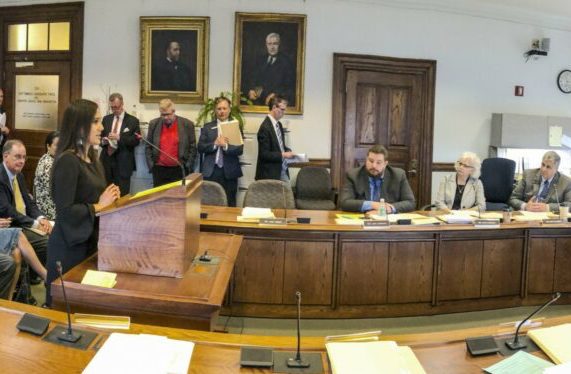AUGUSTA — Lawmakers made progress Monday hashing out the details of a proposal to legalize sports betting in Maine but have yet to finalize several key issues, most notably the state’s share of gambling revenues.
More than a half-dozen states have legalized wagering on athletic events since the U.S. Supreme Court struck down a federal prohibition last year. Lawmakers in Maine and more than two dozen other states are now debating whether to follow suit by allowing betting only at specific “brick-and-mortar” locations, via online platforms or both.
On Monday, members of the Legislature’s Veterans and Legal Affairs Committee spent much of the day deep in the weeds of gambling policymaking as they debated how old a person has to be to place a bet, who could offer sports betting and how much to charge in license fees.
There appeared to be bipartisan – but not unanimous – agreement among committee members on setting the minimum age at 21, consistent with the law to play slot machines or table games at the state’s two casinos.
Rep. John Schneck, D-Bangor, said it would be potentially confusing to allow 18-year-olds into some areas of a casino to gamble on sports but not other areas.
“I just think to get this thing off the ground, we should keep it simple,” said Schneck, the committee co-chair.
Others favored allowing 18-year-olds to place sports bets since they can already do so at off-track betting parlors.
“I just feel when you are 18 years old, you are considered an adult and you should have all of the rights that go with that, including the ability to participate in this, if you’d like to,” said Rep. John Andrews, R-Paris.
The current proposal would allow gambling on professional, college and amateur sports, but would prohibit wagering on high school sporting events as well as on events featuring Maine-based colleges and universities.
The draft proposal would allow the following entities to apply for on-premise sports betting licenses: Maine’s two full-fledged casinos in Bangor and Oxford; Scarborough Downs racetrack; the four off-track betting locations in Brunswick, Sanford, Lewiston and Waterville; and the state’s four Native American tribes.
Committee members also supported allowing betting online or on mobile devices, which constitutes the vast majority of wagers placed in states that have legalized sports wagering. But they did not vote on whether to require online betting platforms to be connected or “tethered” to a physical facility in the state.
Lawmakers also adjourned their work session without resolving how much to tax sports betting revenues.
Tax rates vary widely among the dozen states that have already legalized sports betting or are poised to do so. Mississippi and Nevada, for instance, collect 6.75 percent from the revenues collected by the betting operator after winnings have been paid out. Rhode Island, by comparison, taxes 51 percent of operator revenues while Delaware collects 43.75 percent, according to data distributed to the committee Monday.
Sen. Louis Luchini, D-Ellsworth, proposed following New Jersey’s lead with a two-tiered tax system. Operations with a physical location in Maine would be taxed 10 percent, while online-only operators would be taxed 18 percent under Luchini’s proposal.
“It recognized the fact that the brick-and-mortar (operators) have employees and pay property taxes in the state,” said Luchini, the committee co-chair.
Other committee members proposed a two-tier system of 8 percent and 10 percent, or 10 percent and 15 percent. Some of those advocating for lower tax rates suggested that it could help draw more users away from illegal or unregulated online betting.
The committee could resume the discussion during a work session Thursday. Any proposal – or proposals – emerging from the committee will then be debated on the House and Senate floors.
Send questions/comments to the editors.



